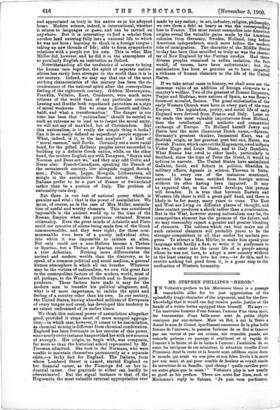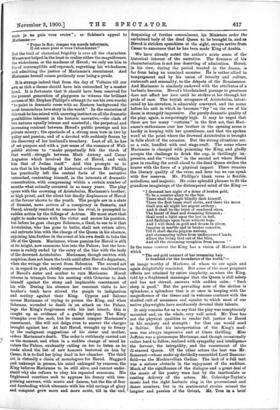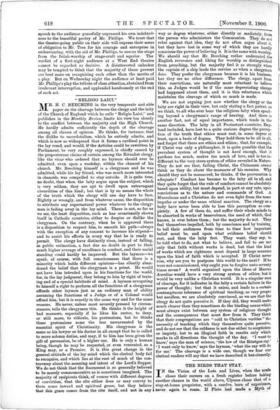MR. STEPHEN PHILLIPS'S " HEROD."
IN Voltaire's preface to his Marialnne there is a passage remarkable alike for its just appreciation of the splendidly tragic character of the argument, and for the fore- knowledge that it would one day receive poetic justice at the hands of a writer better equipped than himself. He says :— "La mauvaise humeur d'une femme, l'amour d'un vieux man, les tracasseries d'une belle-sceur, sent de petits objets comiques par eux-memes. Mais un Roi,'a qui la Terre a donne le nom de Grand, eperliment amoureux de la plus belle femme de l'univers; la passion furieuse de ce Roi si fameux par ses vertus et par ses crimes, ses cruautes passes, ses remords presens : ce passage si continuel et si rapide de l'amour a, la haine, et de la haine l'amour : l'ambition de sa simur, les intrigues de ses ministres, la situation cruelle d'une Princesse, dont la vertu et la beaute sent celebres encor dans is monde, qui avait vu son pere et son frere livres h la mort par son man, et qui pour comble de douleur se voyait aimee du meurtrier de sa famine: quel champ ! quelle carriere pour un autre genie que le mien !" Voltaire's play is not nearly so good as his preface. There are some fine lines, such as Mariamne's reply to Salome, "Je pals vous pardonner, /Dais je ne puis vous croire " ; or Solzeme's appeal to Mariamne :--
" Fnyez le Roi ; rompez vos nceuds inforttmes, II est assez pnni ei volts l'abandonnez."
But the trail of rhetorical frigidity is over all the characters. We are not helped in the least to realise either the magnificence, the wickedness, or the madness of Herod ; we only see him in fits of contemptible self-reproach, regretting his wickedness, and admitting the justice of Mariamne's resentment. And Mariamne herself comes perilously near being a prude.
It is strange indeed that from the day of Voltaire till our own so rich a theme should have lain untouched by a master hand. It is fortunate that it should have been reserved for the present generation of playgoers to witness the brilliant success of Mr. Stephen Phillips's attempt (to use his own words) "to paint in dramatic verse with an Eastern background the most tremendous love story in the world." In the execution of this task he has seized with unerring instinct on all the dramatic possibilities inherent in the historic narrative,—the clash of two natures equally intense and masterful ; the perpetual and increasing contrast between Herod's public prestige and his private misery; the spectacle of a strong man torn in two by policy and passion, and of a devoted wife suddenly frozen by the discovery of her husband's treachery. Last of all, he has of set purpose and with a just sense of the romance of Welt- politik striven to "make perpetually felt the throb of that world - struggle between Mark Antony and Ccesar Augustus which involved the fate of Herod, and with him that of Judzea itself." And this prompts us to note that in his handling of historical evidences Mr. Phillips has practically left the central facts of the narrative untouched, contenting himself, in the interests of dramatic concentration, with compressing within a certain number of months what actually occurred in as many years. The play opens with the crowning of Aristobulus, Mariamne's brother, as high priest, and the silent but deadly displeasure of Herod at the favour shown to the youth. The people are in a state of ferment, news arrives of a conspiracy in Samaria, and Herod, already resolved to remove his rival, is prompted to sudden action by the tidings of Actium. He must start that night to make terms with the victor and secure his position, but before he goes charges Sohemus, a Gaul, to see to it that Aristobulus, who has gone to bathe, shall not return alive, and entrusts him with the charge of the Queen in his absence, enjoining him further in the event of his own death to take the life of the Queen. Mariamne, whose passion for Herod is still at its height, now summons him into the Palace; but the love- scene is rudely ended by the entry of the bier with the body of the drowned Aristobulus. Mariamne, though smitten with suspicion, does not learn the truth until after Herod's departure, when she wrings the secret from Sohemus. The second act is, in regard to plot, chiefly concerned with the machinations of Herod's sister and mother to ruin Mariamne. Herod returns in triumph from his meeting with Octavius to dash himself against the stony and implacable resentment of his wife. During his absence her constant visits to her brother's tomb have stirred the people to indignation and mutiny against their King. Cypros and Salome accuse Mariamne of trying to poison the King, and when Sohemus, wounded to death in an attack on the Palace, begs the King's forgiveness with his last breath, this is caught up as evidence of a guilty intrigue. The King triumphs over the mob, but he cannot conquer Mariamne's resentment. She will not deign even to answer the charges brought against her. At last Herod, wrought up to frenzy by the malignant suggestions of his sister and mother, orders Mariamne's death. The order is ruthlessly carried out on the moment, and when in a sudden change of mood he enters the Palace, exultantly calling on her to listen as he reads aloud the list of new honours bestowed on him by Cesar, it is to find her lying dead in her chamber. The third act is virtually a chain of monologues for Herod. Haggard and unkempt in person, his mind unhinged by remorse, the King believes Mariamne to be still alive, and cannot under- stand why she refuses to obey his repeated summons. His frightened courtiers seek to appease his frenzy with tem- porising answers, with music and dances, but the fits of fear and foreboding which alternate with his wild ravings of glory and conquest grow more and more acute, till in the end, despairing of further concealment, his Ministers order the embalmed body of the dead Queen to be brought in, and as Herod is stricken speechless at the sight, envoys arrive from Ccesar to announce that he has been made King of Arabia.
We have already noted the author's acute sense of the historical interest of the narrative. The firmness of his
characterisation is not less deserving of admiration. Herod, in his view, during the period treated in the drama, is far from being an unmixed monster. fie is rather allied in tempevinent and by his union of ferocity and culture,
statecraft and sensuality, to the despots of the Renaissance. And Mariamne is similarly endowed with the attributes of a barbaric heroism. Herod's bloodstained passage to greatness does not affect her love until he strikes at her through her pride of race. The boyish arrogance of Aristobulus, intoxi- cated by his elevation, is admirably conveyed, and the scene before his exit in which he becomes " fey " on the eve of his doom is strangely impressive. i'he purely dramatic quality of the play, again, is surprisingly high. It may be urged that there are too many " curtains " in the first act, that Mari- amne's enthusiasm over her brother in the opening scene is hardly in keeping with her queenliness, and that the spoken word at the point where the drowned Aristobulus is brought in falls short of the occasion. But the strong situations are, as a rule, handled with real stage-craft. The scene where Mariamne is charged with poisoning the King, and gladly accepts the challenge to drink the cup, is thrillingly im- pressive, and the " curtain " in the second act where Herod goes in reading the scroll aloud to the dead Queen strikes the hearer with the force of a physical impact. There remains the literary quality of the verse, and here too we can speak with few reserves. Mr. Phillips's blank verse is flexible, melodious, and majestic. He coins splendid phrases to fit the grandiose imaginings of the distempered mind of the King :—
" I dreamed last night of a dome of beaten gold,
To be a counter-glory to the Sun. Tere shall the eagle blindly dash himself. There the first beam shall strike, and there the moon Shall aim all night her argent archery ; And it shall be the tryst of sundered stars, The haunt of dead and dreaming Solomon; • Shall send a light upon the lost in hell, And flashings upon faces without hope.
And I will think in gold and dream in silver, Imagine in marble and in bronze conceive, Till it shall dazzle pilgrim nations, And stammering tribes from undiscovered lands, Allure the living God out of the bliss, And all the streaming seraphim from heaven ! "
In the same context the King has a vision of Mariamne in which "The red- gold cataract of her streaming hair
Is tumbled o'er the boundaries of the world,"— an image worthy of Marlowe, of whom we are again and again delightfully reminded. But some of the most poignant
effects are attained by entire simplicity, as when the King, told by a frightened messenger that the Queen is still asleep and has not stirred, answers with sudden calm : "Such sleep is good." But the prevailing note of the diction is splendour, a splendour that is at once in keeping with the magnificence of the theme and in welcome contrast with the studied cult of meanness and squalor to which most of our native playwrights have assiduously devoted their talents.
It only remains for us to say that the play was sumptuously mounted and, on the whole, very well acted. Mr. Tree has not the physical qualities to render full justice to Herod in his majesty and strength : for that one would need a Salvini. But his interpretation of the King's mad- ness was always impressive and at times thrilling. Miss Jeffries was a picturesque Mariamne, and though occasionally rather hard to follow, realised with sympathy and intelligence the fervour, the intrepidity, and the resentment of the ill-starred Queen. Of the other actors the best was Mr. Somerset—whose make-up decidedly resembled Lord Beacons- field—as the Machiavellian Gradias. The lack of a full text was a serious obstacle in the enjoyment of the auditors.
Much of the significance of the dialogue and a great deal of the music of the poetry were lost by the inarticulate or ranting delivery of the actors. Mr. Coleridge-Taylor's music had the right barbaric ring in the processional and dance numbers, but in its sentimental strains missed the languor and passion of the Orient* Mr. Tree in a brief
speech to the audience gracefully expressed his own indebted- ness to the beautiful poetry of Mr. Phillips. We trust that the theatre-going public on their side will express their sense of obligation to Mr. Tree for his courage and enterprise in endeavouring, with the aid of Mr. Phillips, to rescue the stage from the fetish-worship of stage-craft and squalor. The verdict of a first-night audience at a West End theatre cannot be regarded as decisive. A disinterested onlooker may be tempted to think that the majority of those present are bent more on recognising each other than the merits of a play. But on Wednesday night the audience at least paid Mr. Phillips's play the tribute of close attention, abstained from irrelevant interruption, and applauded handsomely at the end of each act.
























































 Previous page
Previous page